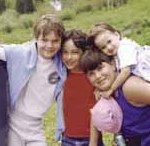 Reprinted from Loving More Magazine Winter Issue #37
Reprinted from Loving More Magazine Winter Issue #37
It has never been obvious to me that there is anything intrinsically harmful to children in their parents living polyamorously. I myself was raised by a mother who, though she never heard the word "polyamory", believed that loving more than one person at a time was both possible and positive. I don't claim that my raising was flawless . . . far from it . . . but the mistakes my parents made with me had nothing to do with their attitude towards sexual exclusivity.
I am not an expert in child development. Dammit, Jim, I'm a lawyer, not a psychologist! But I am a parent who has been poly for a long time and I have done a lot of thinking about this issue.
I have an idea of what human families looked like earlier in our history. A farm family is in their kitchen. The teething baby is being comforted by widowed Greatgrandma, who has arthritis and can't really help with the work any more but who loves babies. Grandma is making pancakes and showing the ten-year-old how to help. Father is mending harness. The two-year-old is having his diaper changed by Aunty. The thirteen-year-old is carving, with the assistance of his uncle. The eighteen-year-old is winding wool onto a ball, while her boyfriend holds the skein. Mama is sewing. When the baby starts to cry, and it's clear he's hungry, sister-in-law takes him from Greatgrandma and puts him to her breast. Her own nursling is asleep for now. Mama looks her thanks and finishes her work. Then she settles down to nurse the baby herself.
This is how I imagine family life to have been in, say, 1870. In this scenario, there are plenty of well-intentioned adults or near-adults available to meet the needs of any child.
I have a similar vision of a Neolithic family in their hut or cave--sitting around the fire, several generations, older sibs, cousins, aunts and uncles, all happily taking their turn at childcare..
I suspect the foregoing descriptions are pretty accurate, because of my personal observations of the way human infants behave. What does a young fawn or a quail chick do when danger threatens? It stays perfectly still and doesn't make a sound until momma gives the all clear. What does a human baby do when danger threatens and her parents are stressed out? Screams bloody murder.
If you are driving in the dark in a rainstorm in a strange town, lost and almost out of gas, is the baby in the back seat looking peacefully out the window? No. The little darling is screaming her head off, because she senses the tension in the car, and wants somebody to do something about it. She can hear the strain in your voice, and smell the nervous sweat that is dampening your armpits.
In other words, human babies behave as though they expect the world to provide them with enough laps and loving arms that when mama and daddy are dealing with the saber-toothed tiger, there will be other comforting grown-ups around. Human babies are wired for clans, not "nuclear families" where mom is home alone with the kids. Therefore, I believe that raising children in ways that are healthy and natural for them is one thing polyamory can be good at. Polyamory makes clans.
I am not alone in holding this opinion.
Polyamorist Raven Caldera writes of his experience, "Everybody wants to ask my daughter about what it's like to have polyamorous parents, as if it were a big deal. Although every child is different, most of the kids I've met who have poly parents actually like having all those extra adults around to pay attention to them, if only for a few minutes. If you pick the right people, [polyamory] can be about providing a village to raise your child. And just because we have more than one lover doesn't mean we're doing it on the kitchen table every morning."
Furthermore, child development experts have said publicly that being raised by good poly parents is not harmful to children. I quote a licensed clinical social worker, Arlene Istar Lev, writing in Proud Parenting: ”I want to be blatantly clear, at the risk of upsetting my more conservative readers, that a polyamorous lifestyle can be a healthy, loving, nurturing environment in which to raise children, regardless of one's sexual orientation, marital status, or methods of conception.”
Sid Mansfield, a Phoenix-area child and family therapist, is quoted in the Tucson Weekly: "The key word in raising well-adjusted children is 'stability'. If a child is raised in a home where the adults are honest, open, loving and consistently present, physically and emotionally, it's not going to matter whether those adults are monogamous or polyamorous. When kids grow up with an adult model of mature, responsible behavior on a constant basis, they'll be far more likely to behave that way too. I'd much rather see a child grow up in a nurturing polyamorous home than be exposed to a steady stream of stepparents in a serially monogamous one. It's far more emotionally damaging for a child to deal with the chaos of all that change."
The National Coalition for Sexual Freedom comments, on their web site: “If parents are happy in their intimate relationships, it helps the family. Happy families are good for children. . . . More adult caretakers means more people available for child care, help with homework, and rides to soccer practice. Children thrive on love. The more adults they have to love them who are part of the family, the happier and more well-adjusted they are. There is no evidence that growing up in a poly family is detrimental to the physical, psychological or moral well being of children.”
 It is hard to imagine that a child who lives with or sees regularly more than two ethical, involved adult parent figures would have a harder time than one who lives with a bitter single mother, sees an angry, wounded father every other weekend and is exposed to a series of the parents' new partners who enter and leave the child's life. Children in modern "blended" families must cope with step-parents, absent parents, step-siblings, half-siblings. Why would that be worse than being raised in a responsible, healthy poly clan?
It is hard to imagine that a child who lives with or sees regularly more than two ethical, involved adult parent figures would have a harder time than one who lives with a bitter single mother, sees an angry, wounded father every other weekend and is exposed to a series of the parents' new partners who enter and leave the child's life. Children in modern "blended" families must cope with step-parents, absent parents, step-siblings, half-siblings. Why would that be worse than being raised in a responsible, healthy poly clan?
As more and more polyamorous people find each other and establish intentional families, and as more and more of them either bring existing children with them or conceive new ones, they will produce a cohort of young people who are confident, ethical, self-actualizing, open-minded and secure. Two of them live at my house.
Copyright Loving More Magazine and Valerie White 2007






